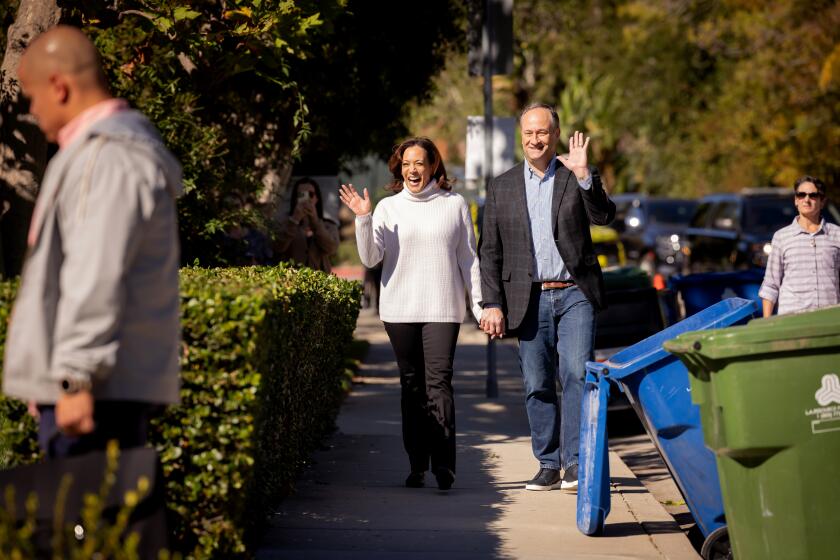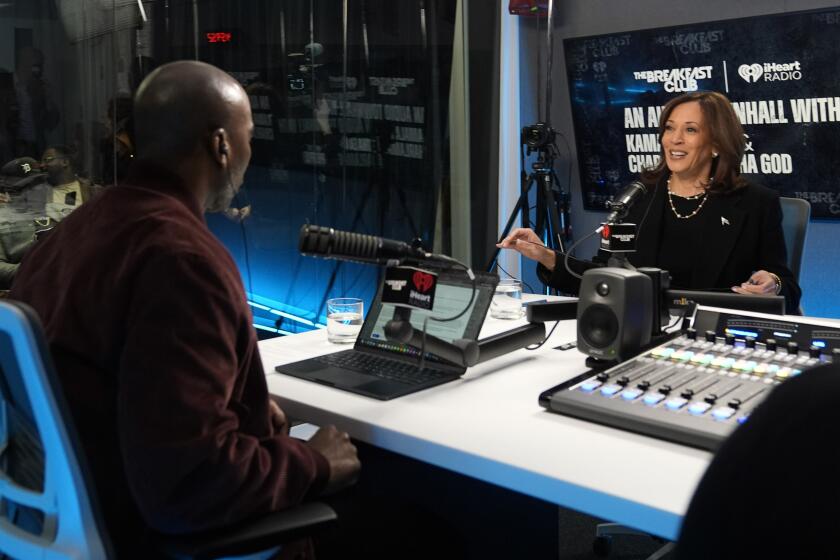THE TIMES POLL : Voters Say Initiatives Are ‘Out of Control’
California voters will be in a highly cynical mood when they face a monstrous list of ballot propositions Tuesday, contending that the measures are too complex to analyze intelligently and that the once-revered initiative system is “out of control,” The Los Angeles Times Poll found.
Voters also feel that laws should be written by the Legislature and governor, rather than by special interests using the initiative process, interviews showed.
Adding to the voters’ sour mood is the overwhelming belief that the TV campaign commercials bombarding them are usually misleading.
As for Sacramento, voters seem to be irritated with the legislative and executive branches of government. Speaking abstractly, without referring to individuals, the electorate says it is time for political power to switch in both branches: from Democrat to Republican in the Legislature and from Republican to Democrat in the governor’s office.
This is just frustration talking. Voters still generally support their local legislator, the survey showed. And there is little indication that voters intend to replace Republican Gov. George Deukmejian with Democrat Dianne Feinstein. If anything, The Times survey points to Republican Sen. Pete Wilson as a slight favorite.
The survey showed that voters tend to prefer the checks and balances of divided power, with each party controlling one of the branches of government.
Although Californians think there are far too many confusing ballot measures, it remains to be seen whether a “just vote no” revolt is brewing.
“The voters have been getting an overload of these (measures) for a decade and this year the dam really broke,” said Larry L. Berg, director of the Jesse M. Unruh Institute of Politics at USC. Like many academicians, politicians and citizens, Berg thinks the initiative system has been running amok.
“You can’t run a state of 30 million people with initiatives,” Berg said. “You don’t have any (state) budget flexibility (when they pass). The Legislature and the governor become severely restricted on what they can do. And that produces more stalemate in Sacramento and more frustration among voters. That in turn spawns another series of initiatives. It’s Catch 22--back in a circle. Somewhere along the line the circle has to be broken.”
Berg is not advocating a voter revolt, necessarily. But he and many people say that after this election, the initiative process should be reassessed, perhaps by a constitutional revision commission. “We have to get away from these highly competitive initiatives that confuse the voters and enrich the (campaign) consultants,” Berg said.
Under the present direct initiative system, sponsors can place a measure on the ballot by collecting a certain number of voter signatures: For a statute, 5% of the total who voted in the last gubernatorial election; 8% for a constitutional amendment. Once voters approve an initiative, it becomes very difficult to amend. Often, it requires another ballot measure.
There will be 28 measures on Tuesday’s ballot--13 of them initiatives and 15 placed by the Legislature, many of them bond issues.
Eugene C. Lee, a veteran UC Berkeley political science professor and longtime student of state government, recently wrote for California Policy Choices, published by USC: “In 1911 (when the system was introduced), the initiative was a practical institutional response to the dominance of California political life by a single monopoly--the Southern Pacific Railroad. . . . In 1990, representative government is threatened, not by a private monopoly, but by the initiative process itself. In a paradoxical turn of events, the initiative, instead of serving as a (citizen) safety valve, has become an uncontrolled political force of its own.
“It is a force that has produced occasional benefits but at an extraordinary cost--an erosion of responsibility in the executive and legislative branches of state government, a simultaneous overload in the judiciary and an over-amended state Constitution alongside a body of inflexible ‘quasi-constitutional’ statutory law.”
Lee continued: “Important aspects of the state’s political agenda are being set, not by its elected leaders, but by unaccountable single-interest groups operating in a fragmented, uncoordinated and frequently contradictory manner.”
Voters interviewed by The Times Poll seemed to agree. The telephone interviews of 1,993 registered voters were conducted for four days ending Tuesday night. The margin of error was 3 percentage points in either direction.
By a 3 1/2 to 1 ratio, voters--Democrats and Republicans alike--agreed with the statement that “the initiative process has gotten out of control in California elections.”
By 6 to 1, voters asserted that “there are so many initiatives on the ballot with complex issues that an average voter cannot make an intelligent choice.”
And by nearly 3 to 2, they said “it is better for laws to be written in Sacramento by the Legislature and the governor” rather than “by groups that place initiative measures on the ballot.” Republicans subscribed overwhelmingly to that thesis. Democrats agreed, but by a narrower margin.
Voters blame the glut of initiatives, in large part, on their elected representatives’ failure to resolve critical state problems.
Asked during a September survey by The Times Poll why they thought there were so many initiatives on the ballot, the voters’ No. 1 target was the Legislature for “failing to do its job.” The next culprit was “special interests who use initiatives to get around the Legislature.” Voters also said “it is too easy to qualify a proposition on the ballot.”
A Times survey less than two weeks ago found that voters, by 2 to 1, disapproved of the Legislature’s job performance. But in the latest survey, voters also said, by 3 to 2, that their own state legislator deserves to be reelected.
Interviewers pointed out that Democrats have dominated the Legislature for 20 years and asked voters whether they thought the same party should remain in control, or whether it was time for a change to Republican leadership. By 4 to 3, voters replied that it was time for a change to the GOP--an improbability Tuesday, given the Democrats’ solid control of both houses.
Only about half the Democratic voters thought their party should keep control of the Legislature. The remainder were divided between people who believe the GOP should take over and those who were not sure.
On the other hand, voters, also by roughly 4 to 3, thought it was “time for a change” to a Democratic governor after eight years of a Republican chief executive. Only 6 in 10 Republican voters said the GOP should retain the governor’s office. The rest were split between favoring Democratic executive control and not having an opinion.
What all this seems to suggest is that voters favor change in the abstract, but are more skeptical when specific candidates are mentioned. For example, Democrat Feinstein clearly is regarded as “the candidate of change” in the governor’s race, the survey showed, but if either candidate has an edge approaching Election Day, it is Republican Wilson.
Also in the abstract, voters by 4 to 3 said they prefer that “one party controls the Legislature and the other party controls the governor’s office so they can keep a check on each other,” rather than having one party control both branches of government “so they can work together and achieve the party’s goals.”
“There has not been enough written about the result of divided government and how much of a factor it is in all the silliness that has gone on in Sacramento and more recently in Washington,” said Sherry Bebitch Jeffe, a political analyst at the Center for Politics and Policy, Claremont Graduate School.
While academicians and other political junkies contemplate divided government and a bulging ballot, the voters this weekend are being peppered with a blitz of TV commercials they basically distrust. By 8 to 1, those interviewed said political commercials “are usually misleading” rather than “informative.”
The Times survey was supervised by Susan Pinkus, assistant poll director.
VOTER VIEWS
Following are results from the Los Angeles Times Poll of 1,993 registered voters, taken from Oct. 27 through last Tuesday. Do you agree or disagree with the following statements?
“The initiative process has gotten out of control in California elections.”
Agree: 72%
Disagree: 20%
Don’t know: 8%
“There are so many initiatives on the ballot with complex issues that an average voter cannot make an intelligent choice.”
Agree: 84%
Disagree: 14%
Don’t know: 2%
Generally speaking, do you think it is better for laws to be written in Sacramento by the Legislature and the governor, or do you think it is better for laws to be written by groups that place initiative measures on the ballot?
Laws written by Sacramento and the governor: 48%
Initiative process: 34%
Don’t know: 18%
Source: Los Angeles Times Poll
More to Read
Get the L.A. Times Politics newsletter
Deeply reported insights into legislation, politics and policy from Sacramento, Washington and beyond. In your inbox three times per week.
You may occasionally receive promotional content from the Los Angeles Times.











